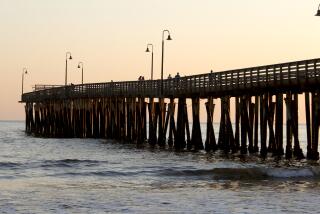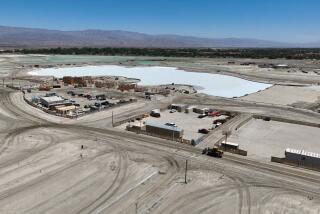Planners Offer New Details of Luxury Resort at Crystal Cove
- Share via
CRYSTAL COVE — Planners of a luxury resort at Crystal Cove State Park on Thursday offered the most detailed glimpse to date of a pricey but environmentally correct beachfront retreat--complete with a full-time marine biologist, classes for schoolchildren and a telescope scanning the nighttime sky.
They conceded that with rates of $100 to $400 a night, a private resort on public parkland will not be within reach of everyone.
“Will everyone be able to afford them? No,” said Donald W. Murphy, director of the state Department of Parks and Recreation. But he portrayed the resort as a melding of public and private interests at one of Orange County’s most scenic spots.
Michael Freed of Resort Design Group, a key player in the resort plan, said it would provide for far more public access than what is present today in Crystal Cove’s 12.3-acre historic district because of features like a restaurant, a dive shop, public education efforts and the fact that historic cottages will be rented for overnight use.
Murphy and Freed visited Orange County this week amid a controversy over whether such an expensive resort should be built on public land. They met with reporters and environmentalists to outline their vision of preserving historic cottages, increasing public access and being ecologically sensitive.
The visit came shortly before the state and developers were expected to sign a 55-year contract for a resort in the cottage area at Crystal Cove, between Corona del Mar and Laguna Beach. The concession contract would be the lengthiest in the state parks system.
*
The specifics of what access the public will have in the resort area remained unclear during a two-hour interview with Freed and Murphy on Thursday. The 120-seat restaurant will be open to the public and may include a telescope, such as one at a sister resort in Big Sur, the luxurious Post Ranch Inn. The beach by the cottages will be open to the public as well.
But the exact delineation between private resort and public parkland remained murky.
Murphy said a sign might be displayed, stating: “Do not disturb guests.” Freed suggested “that there would be areas designated for guests and areas designated for the general public.” Walls will not enclose the resort, they said.
Freed emphasized the small, intimate nature of the resort. “You’ve got the wrong developer if you want 200 rooms,” he said.
“We are not a Ritz-Carlton.”
The state has refused to make public the developers’ proposal for the project, which parks officials accepted in April 1996. Parks Chief Counsel Tim S. LaFranchi said in a letter Tuesday to an attorney representing The Times that the proposal will not be released until the contract is signed.
Parks officials said they expect the contract to be signed by Sept. 15 and possibly as early as next weekend.
The Times reported this month about plans for a Crystal Cove boutique resort with 60 to 90 units, a restaurant and as many as three swimming pools.
*
On Thursday, Murphy and Freed provided new details about the project, estimated to cost $20 million to $25 million:
* The resort will include a number of features available at its sister resorts, the Post Ranch Inn and the Jean-Michel Cousteau Fiji Islands Resort.
* Most of the 46 cottages will be restored in their original 1920s and ‘30s California vernacular architectural style and may have arts-and-crafts-style interiors.
* Two interpretive centers may be developed, offering lectures, videos and other ways the public can learn about geology, human history and terrestrial and marine ecology.
* Education programs are intended to include local schoolchildren as well as hotel guests. Scientific studies such as a dolphin-monitoring program may be launched.
* Handicapped parking will be available at the beach.
* The overnight rates of 10% of the units would be available at a 50% discount off the average rate. Freed said the average rate could be more than the $225 a night the state mentioned earlier.
The planners talked of making guests more environmentally conscious by example.
A tasteful lavender card at the Fiji resort tells hotel guests: “You can help save energy and water. Customarily, bed linens are changed daily, but if you feel this is unnecessary, kindly place this card on your pillow before you depart in the morning, and your sheets will not be changed that day.”
Members of local environmental groups toured the historic district with Freed and parks officials Wednesday, coming away with differing views.
Fern Pirkle, president of Friends of the Irvine Coast, said she came away with a generally positive impression of the environmental safeguards planned for the resort. “It seems to me that a lot of the environmental problems, they are dealing with very directly . . . Like almost everything that goes into preserving the environment, a price goes with it.”
She said that while the rooms will cost more than some can afford, the trade-off is that public access will increase, “and that, to me, seems to be a public benefit.
She noted the high cost of renovating the cottages, which are listed on the National Register of Historic Places.
But Jeannette Merrilees of Laguna Beach, who also toured the cottages Wednesday, was far more critical.
*
“It sounds to me like it’s going to be a resort for the wealthy, and it doesn’t sound like ordinary people are going to be able to use the area,” said Merrilees, a volunteer docent who leads tide pool tours for the park. “These cottages don’t need modern tile bathrooms. People don’t expect that. If they just have basic amenities, that’s all people expect in a place like that.”
Merrilees said the educational programs were “just a smoke screen come-on. The park rangers are already doing that.”
The resort would be developed by Crystal Cove Preservation Partners, made up of four partners: Resort Design Group, Post Ranch L.P.--the owner of Post Ranch Inn--Investec of Santa Barbara and a firm named EKOTEK.
Roy Roberson of EKOTEK, an Orange County-based civil engineer, said he brought the resort plan to the attention of officials at the Post Ranch Inn.
The state expects to make more than $60 million over the 55-year-term of the contract. The developers would pay the state 5% of their annual gross receipts. The state is not guaranteed a minimum income.
More to Read
Sign up for The Wild
We’ll help you find the best places to hike, bike and run, as well as the perfect silent spots for meditation and yoga.
You may occasionally receive promotional content from the Los Angeles Times.






